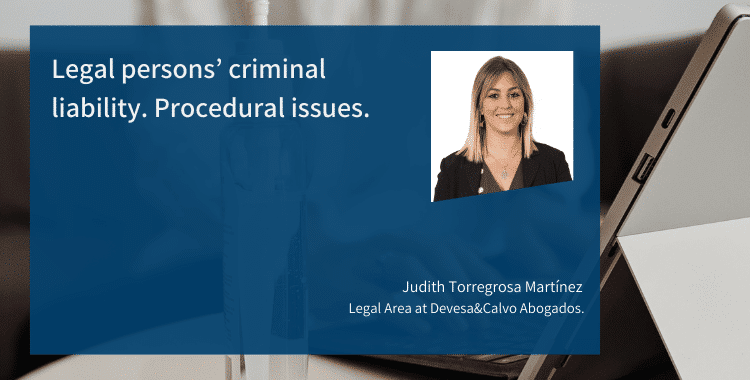
Legal persons’ criminal liability. Procedural issues.
The new criminal liability version since the approval of the Organic Law 5/2010 of the 23rd of June, attributes the possibility that the legal person may be charged in accordance with the provisions in Article 31bis of the Criminal Code and consequently may be sentenced under the terms of Articles 33.7 and 66 bis of the same legal text.
However, in order to make operational the legal persons’ participation as passive subjects of criminal proceedings, it was necessary to adapt the procedural legislation to this new type of criminal charge, meanwhile they can be charged, accused and criminally convicted. Their rights within the proceeding must also be guaranteed.
In our legal system there is only room for conviction for own conduct, and that legal person’s conduct is what can be generically called an organizational fault, consists in omitting necessary actions to avoid crime commission within the company. Therefore, the organizational fault or control’s omission are the only two bases to proceed to a legal person’s imputation for criminal liability.
The Judiciary General Council has already warned of the serious procedural difficulties that could be deduced and which required, if necessary, the appropriate legal modifications. The following were noted:
– The procedural capacity and representation in the process of entities without personality.
– The necessary representation of legal entities, conflicts of interest with the natural persons involved.
– The applicants’ appointment, free legal aid for legal persons and entities without personality.
– The possibility for the legal person to combine the procedural accuser and accused positions.
– The extension of procedural rights to the legal person.
– The conformity with the accusation, absence and defiance of the legal person.
– The position and procedural rights of the affected third parties or the effects of the judgement’s material res judicata.
To this effect, with Law 37/2011, of the 10th of October, on measures of procedural facilitation, an attempt was made to fit the legal entity’s imputation into the procedural regulation.
In conclusion, first we need to have a natural person as a criminal responsible and then we can start to consider if there is also legal person’s criminal responsibility.
The legal entities’ criminal liability due to structural defects in the management model, surveillance and supervision constitutes the basis of corporate crime liability. The validity of the innocence presumption right imposes the need to prove the concurrence of serious breach of the supervisory duties.
The foregoing, without prejudice to the fact that the legal person being investigated may use the evidence means that deem appropriate to demonstrate its proper functioning from the compliance with the law’s perspective, withing which must include the implementation of a program of regulatory criminal compliance or better known as compliance program.
Legal Area at Devesa&Calvo Abogados.
